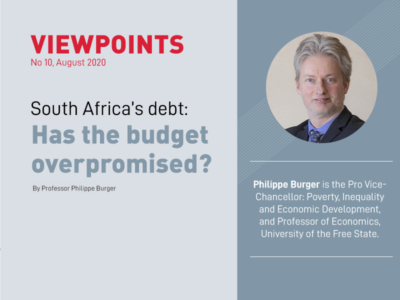
- The Supplementary Budget Review advocates for a rapid fiscal consolidation, targeting a primary surplus to be achieved by 2023/24. Professor Philippe Burger argues that achieving a primary surplus by 2023/24 would require fiscal consolidation far more rapid than IMF structural adjustment programmes generally envisage.
- On Finance Minister Tito Mboweni’s active scenario, the debt will peak at just more than 87% of GDP in 2023/24, before falling to under 74% in 2028/29, while the passive scenario will see South Africa’s debt to GDP ratio increase to 141% by 2028/29.
- Burger believes that the adjustment budget’s active scenario is not realistic – stabilising the debt to GDP ratio below 100% is neither economically nor politically feasible in a low growth, high interest rate environment.
- Achieving a primary surplus of the size needed to stabilise the debt to GDP ratio below 90% is undesirable as it would necessitate either an impossibly large increase in taxes or an implausibly large a cut in spending, either of which could well reduce GDP growth.
- Burger outlines a stability scenario, whereby the debt burden would stabilise at 100% of GDP by 2026/27. He shows that even this would require GDP growth rates not seen since the mid-2000s and primary surpluses that are higher than those seen in IMF adjustment programmes.



